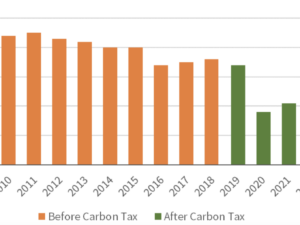By Elizabeth Fisher
That collective “Say what?!” you might have heard today is the reaction of the environmental community on hearing the news that the CEO of Royal Dutch Shell is calling on Big Oil to support policies that address climate change.

Mr. van Beurden will tell a roomful of oil executives in formal wear that the industry should support policies to curb climate change, including a carbon-pricing system and “a shift from coal to natural gas”…
…The solution, Mr. van Beurden says, is for the industry to stop keeping “a low profile on the issue. I understand that tactic,” the speech says, “but in the end it’s not a good tactic.”
Instead, Mr. van Beurden plans to say, “we have to make sure that our voice is heard by members of government, by civil society and the general public.”
Shell has long advocated a price on carbon. When evaluating large engineering projects that they’re planning for 10 to 30 years in the future, Shell imposes an internal price of $40/ton of CO2. Other oil companies use a similar internal price on carbon to hedge their planning in case a fee on carbon is imposed in the future.
Angus Gillespie, VP for CO2 at Shell, told a sold-out crowd at San Francisco’s Commonwealth Club Climate One Oil Ahead (link inactive) event, that even a price of $80/ton would not significantly change Shell’s operations. But when Mary Nichols, California Air Resource Board Chair, cited $200/ton as the point needed to make fossil fuel companies pay attention, Gillespie agreed that would cause a major shift in their strategy.
Shell is counting on development of Carbon Capture and Sequestration (CCS) to allow them to burn all their reserves and then some, which is one of the reasons the company supports carbon pricing.
On CCL’s January international call, David Hone, Chief Climate Advisor at Shell, emphasized the need for business to engage in the climate change solution. Shell sees carbon pricing, which they’ve been supporting since the 1990s, as the better alternative to more command-and-control regulation from EPA and a source of funding to develop CCS, which Hone calls “a societal must have”:
“We have to get to net zero emissions by the end of the century or even before that and we can’t see a way to do that without Carbon Capture and Storage. That’s not to say that you don’t have large deployment of renewables and big changes in the energy mix, but carbon capture and storage has to come in, and pricing is really the driver for that particular technology.”
Shell is betting that CCS will eclipse the large-scale storage capacities needed for electricity from wind, water, and solar.
“We must explore and develop a new model of cross-sector collaboration,” van Beurden told the Center for Global Energy Policy at Columbia University, New York City, on September 2, 2014. He notes that the fossil fuel companies work against a background of the International Energy Agency (IEA) predicting that “meeting that [doubled from today’s energy] demand will require an average annual spend [for extraction, transport and refining of oil and gas; in power generation; and in energy efficiency] of more than $2 trillion between now and 2035.”
Compare that to The Solutions Project, led by Mark Jacobson of Stanford, which details how to apply that same amount of funding over the same time period to move to Wind, Water and Solar (WWS) to meet our energy needs. Jacobson goes even further to say that when health benefits are factored in, the price for WWS is zero.
In Thursday night’s speech, van Beurden planned to acknowledge the distrust that surrounds the oil industry on climate change:
“I’m well aware that the industry’s credibility is an issue. You cannot talk credibly about lowering emissions globally if, for example, you are slow to acknowledge climate change; if you undermine calls for an effective carbon price; and if you always descend into the ‘jobs versus environment’ argument in the public debate.”
The “jobs versus environment” argument, of course, need not be a stumbling block on the way to solutions. A Study by economic modeling firm REMI shows that a national Carbon Fee and Dividend, as proposed by former Secretary of State George Shultz and Citizens’ Climate Lobby, will actually grow the economy and grow jobs while reducing CO2 emissions, providing a dividend to all U.S. households that will more than compensate two-thirds of households for additional costs they’ll see in energy, food or other items. The key is returning the money monthly and equitably to all households to get that money right back into the economy.
The voice of the fossil fuel industry is needed in the debate, not just as the voice of “No” but in helping determine the path forward. Are they ready to lead the charge to a workable solution in which they are still players, or will their fate follow the path of those still making typewriters in a land of computers?
Shell, at least, appears willing to lead.
Liz Fisher is a volunteer with Citizens’ Climate Lobby and a member of the Oil Action Team.





